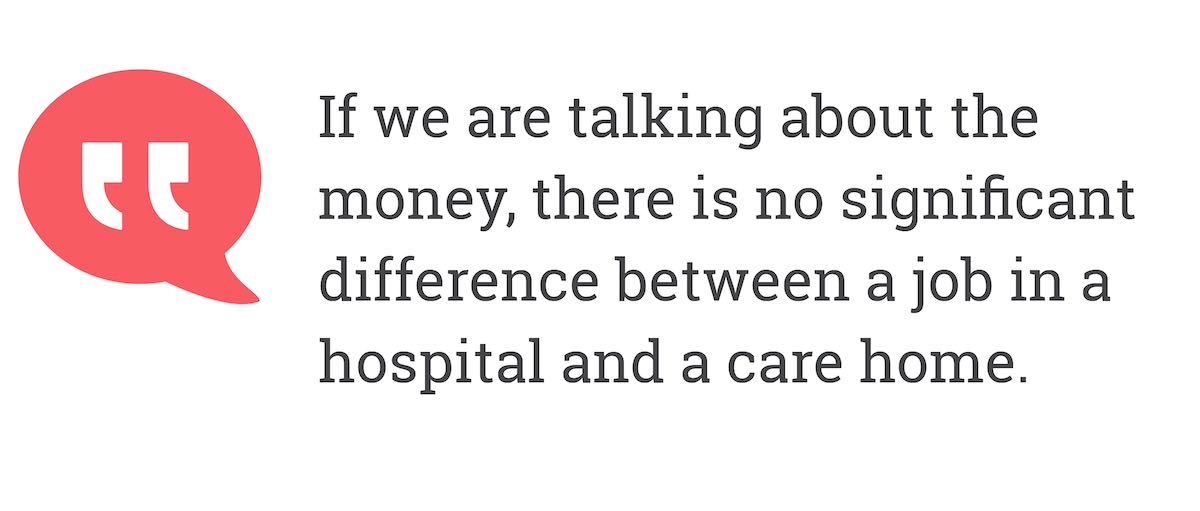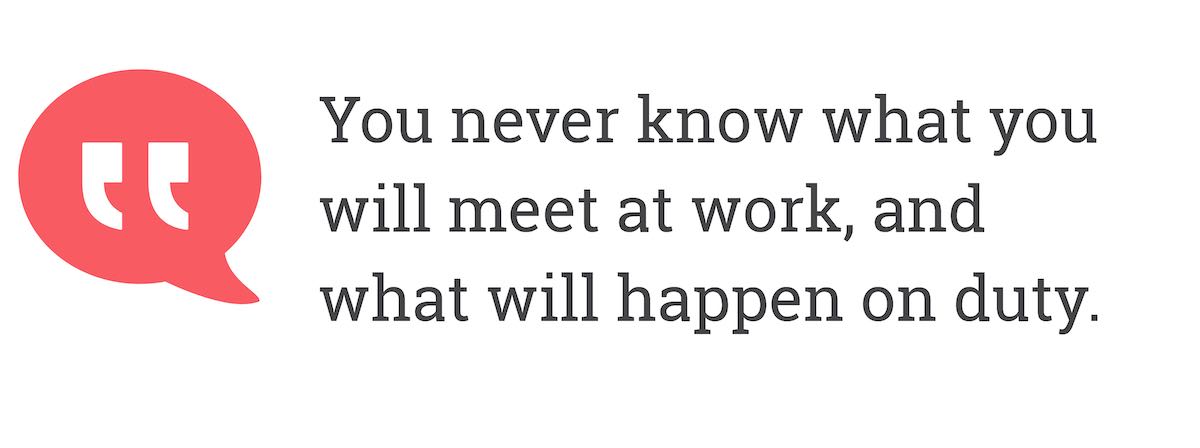Interview questions and how they can vary between hospitals and care homes
When you are looking for a job and you’re expecting an interview in a care home, don’t expect the same questions which you may get in the job interview in a hospital.
It is very low probability they will discuss with you any scientific definitions, most likely they will give you a real life case and analyse your answer.
For example:
• What will you do if a relative notices clothes that belong to their Mum or Dad on another resident? In care home, it is a very possible situation with such easily forgetful dementia patients.
• What do you do if a relative complains about a lost pair of new shoes that they have just brought in yesterday?
• What you have to do if a patient is getting agitated, but refuses his PRN medication?
• What should your action be as a nurse if some resident complaints about care staff.
• Are you able to create a suitable care plan for a patient with aggressive behaviour?
• How do you cope with client who is seeking for an open gate and wants to leave home right now, banging on the door and shouting?
My advice to you is to think carefully and use your logic when answering these questions.
Some answers are linked to the current policy of care home, some to the mental capacity act and it would be a good idea to refresh your knowledge by looking into legislation about mental health.
Also, if you have never been in a care home (especially if the elderly people there have mental health problems) I would highly recommend to go there first as a visitor.
Ask your friends if they have a grandma or an old aunt in there, go with them to visit and speak with the staff and other residents around you.
If you feel like you like the overall environment and would be able to work in such a peculiar place, go ahead!
Working in the NHS vs Working in a care home
I can only say that there are some advantages and disadvantages in both jobs, but work in a hospital is definitely more regulated.
You are usually given a schedule that would last you a month or two and that allows you to plan your appointments/events easier.
In a private sector you have much more flexible hours, and it's easy to take your holiday.
But I have an experience when the only time I knew that my shift was coming up was a week before the shift.
But even then the schedule could suddenly changes.
You have more opportunities to meet other colleagues and healthcare professionals as hospital can give you new friendships.
In a hospital or specialised units made for people with mental health problems such psychiatric intensive care units, you are more likely to meet patients with aggressive and dangerous behaviour.
So you should be physically fit enough and ready that you can face life-threatening situations.
It is quite expected that you will acquire new skills while working in a hospital, and especially clinical skills because of a large flow of patients coming in with different conditions and needs.
If we are talking about the money, there is no significant difference between a job in a hospital and in a care home.
A newly qualified nurse earns a band 5 salary - while a more senior nurse might earn a band 6 or 7 salary. That means you can can earn roughly anywhere between £25,000 and £45,000 a year depending on your experience.
Find out more about NHS pay scales here.
But as I said, with the salary growing you may need to be able to coordinate all ward work.
You can find residential places that will pay more, but as a worker in a NHS system, you probably will get more benefits with taxes and a better secured pension.
Work in a hospital could be more challenging and more intensive, and you definitely will be more of a “busy bee” working there.
If we are talking about a care home.
I like the fact that I can work with one patient for a very long time.
It gives me a chance to establish a bond with them and their relatives find out about patient’s personality traits and nature of their behaviour.
Sometimes we receive patients after their discharge from the hospital in a very poor condition.
They often experienced shock that they have been admitted there.
Sometimes they refuse to eat and drink and resist personal care, are uncooperative with the staff and are angry with their relatives.
Of course, this is also true that they usually are admitted to the hospital in their acute stage and come to us when they are physically and mentally more stable.
And even I know that dementia is not a reversible disease and there is no cure, but I still feel satisfaction when after all efforts from me and my colleagues, our residents start to look better, seem more happy, start to eat, communicate and gain weight.
I like this work in a team with other more experienced nurses with care staff and our GP - a Doctor, who seems to me like a genius in a place of work with elderly mentally sick people with underlying physical problems which are difficult to recognise as most of the patients can’t verbalize what they feel.
In a care home you have a chance to work more closely with Pharmacists, Doctors and other professionals and feel more like a part of the team.
And this what I like about my job.
What qualifications are required for Mental Health Nursing?
It would be silly to associate dementia only with mental health issues.
Usually dementia patients need solving of multiple health issues (such as malnutrition, choking, immobility, pressure sore, falls risk).
For this reason, care homes for elderly people with dementia usually gladly offer you with job if you are RMN (Registered Mental Health Nurse) with some skills of a general nurse.
You should know how to do a dressing according to a dressing protocol, take care of the patients with urine catheter or stoma, be able to manage diabetic patients, and adapt the care plan for patients with COPD and etc.
And vice versa - care homes happily meet a RGN (Registered General Nurse) who is trained in dementia care and be able to create correct care plans, assess patient’s mental stage and risks related, has understanding of problems associated to different types of dementia, as well as ability to manage dementia patients with behaviour difficulty.
A three year degree in university will equip you the skills and knowledge needed for work in the nursing field, and during your training, you will get lots of opportunities to discover work in different sites and choose the work that is right for you.
How to find a right place for you
What is good in this profession is that you will always find a workplace.
If we have a look at the statistics about this market, it is shows that now across the UK, there are 11,300 functioning registered care homes with around 454,000 beds.
To understand the dynamics, looking at the past can present some perspective into this market.
In 1977 there was only 1,249 care homes. They’ve started mushrooming the last 10 - 20 years and prognosis of needs in a residential place, that in 2035 - 2040 it will grow double.
 "I can say I still have passion for my work despite all the difficulties, I think it is a special career which can give satisfaction in your life."
"I can say I still have passion for my work despite all the difficulties, I think it is a special career which can give satisfaction in your life."








About this contributor
Registered Mental Health Nurse
I started work as a Registered Mental Health Nurse in October 2016. I was educated in Latvia, my country of origin. I am a mother of two daughters. I enjoy new experiences of living in another country with new friends, new hobbies and I'm thinking about my career development.
More by this contributorWant to get involved in the discussion?
Log In Subscribe to comment